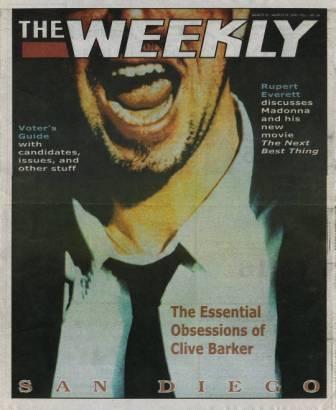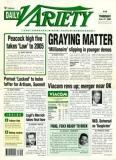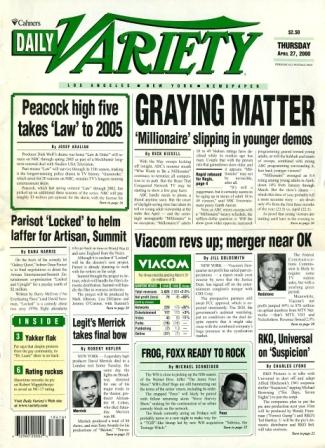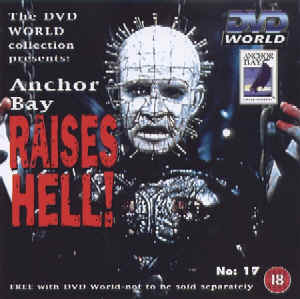Interviews 2000 (Part One)
...Rather than being the apocalyptic year forecast by the Y2K scaremongers, Barker's year was frankly stellar. As ever, the new year saw him laden with a myriad projects on the books - Galilee 2 vied for position with Coldheart Canyon, the Books Of Blood movie and the short story collection. These and other projects (with the possible exception of Undying) were completely eclipsed by the Disney deal in April. The Abarat reshaped Barker's plans not only for the year, but potentially for the rest of his career, instantly moving him up several leagues in the eyes of Hollywood, and therefore the media world at large. The deal, together with the money Universal paid over for Thief Of Always catapulted him into the London Sunday Times "Pay List" of high-earning Brits at a healthy position of 173 (7th biggest earner in publishing) - way ahead of big names such as Anthony Hopkins, Pierce Brosnan and Ewan McGregor, but he'll need to capitalise on all the commercial possibilities of The Abarat to catch up with J.K.Rowling...
The Many Lives Of Clive
By Christopher Landon, (i) The Advocate, Double Issue 802/3, 18 January 2000 (ii) briefly quoted in The Soul Beneath the Skin by David Nimmons, 2002

"A lot of gay people have faced that their entire lives - people telling them, 'You can't
do that.' Once you survive the experience of being told no or being told that what comes
naturally to you is, by their definition, unnatural - something happens in you that is
wonderful. It forces you to work on a new definition for what is natural. And when you
start to reassess yourself, you begin to reassess those who tell you 'Thou shalt not.'
And when you do that, you start to reassess the whole fucking culture. And that's a
wonderful place to be. William Blake said, 'Make your own laws, or be a slave to another man's.'
"Homophobia is not going anywhere. It might go underground, but it isn't going to
disappear. It is in our nature to hate otherness. The question is, Are we made stronger
by being other, or are we weakened as individuals by being other? My argument is that if
we can stand up for the right to be other-and maybe that means being excluded from a
party that isn't very much fun anyway-then we are strong."
AB-solutely FAB-ulist: The Heart & Soul Of Clive Barker
By Remy Dean, Scrawl, pilot issue, 2000 (note : online at http://questingbeastscrawl.blogspot.com/)
"The whole idea of the shamanistic principle, that the tribe can collectively dream a solution to a problem and that the shaman somehow indicates the direction in which the tribe heads off into their collective unconscious, to pick around amongst the bones of old gods and return with news and indications... that is very easily parallel with what, particularly the writer of the fantastique is doing.
"The realist, the writer of naturalist fiction, is necessarily bound, by definition. The fantasist says, all right, I can write about divinity, semi-divinity, demons, gods and spirits of air and water or stone. I can write about human beings, sane, crazed, visionary, even dead and I can write about them all in landscapes that are very realistic or very unrealistic. I can write about them in states of mind which are also worlds unto themselves.
"So when you've got that range of possibilities, reality dissolves, which I think is a dreamstate in a way because in our dreams we also meet the dead, we commune with gods and spirits. Whether we literally do that is an issue which I haven't resolved for myself. I'm tempted to think that sometimes we do, that there is a literal sense in which in certain states of consciousness, dreaming, trance states, drug states, any altered states, I think it's very possible that in some instances we are actually communicating with entities other than human, at least other than living human."
King Of Pain
By Stephen Lemon, Salon.com People feature, 4 February 2000 (note : online at salon.com)
"A few readers do not appreciate gay elements, particularly in the book 'Sacrament,'
which has a gay hero whose sexual preference is very much celebrated. Some readers would
rather that didn't happen. For me the issue is: In horror, which is so much about the
body, how can you avoid sex? The genre often goes to sex as a source of horror. Look at
'Dracula.' It has a profound sexual subtext. He [Dracula] is going around biting these
women and giving them spontaneous orgasms in the middle of Victorian society, which is
not at all approved of.
"Very often, I need characters to do things which, under the right-thinking circumstances,
they would never do. They need to walk metaphorically through a door into another world...
and you've got to get the character to a place where the audience will buy it. Sexual
desire is one great way to do that. It's an important tool for me, if you'll forgive the
expression, a narrative necessity."
Dream Catcher
By Gina McIntyre, Wicked, Vol 2 No 1, February 2000 (Note: interview took place in Autumn 1999)
"The audience goes and sees my movies or Tim Burton's movies or Cronenberg's movies. Do
the critics get that there is something valuable in this material more than they did a
few years ago? I don't think so. It was very interesting to me when we did Gods and
Monsters that the newspapers who reviewed the movie were saying, 'Wasn't it a shame that
James Whale was not given the kind of support as an artist that he should have been given?'
Those same critics who will say that out of one side of their mouths are scorning a new
generation of James Whales. In other words, it's fine to be dead and doing this stuff,
but don't you dare be alive and successful.
"Clearly, the reviews for Sleepy Hollow were very good reviews by and large. If it had
not been from a classic American narrative, would those reviews have been so good? I
don't think they would. I think reviewers are very cautious where the product of the
imagination is concerned. They're intimidated by it very often. It takes years for
reviewers to catch up with what the popular audience already knows, which is that this
material contains valuable truths. It took the reviewers almost a generation to catch up
with Star Wars. The first reviews for that movie were horribly condescending. Later on,
of course, Time magazine realises that Joseph Campbell had something to do with it, so it's
all kind of perfectly legitimised."
The Essential Obsessions Of Clive Barker
By Cody Goodfellow,
(i) The Weekly, San Diego, Vol 1 No 24, 3-9 March 2000
(ii) Lost Souls Newsletter, May 2000

"The fact that language is all these many things: a way to keep onions
off your hamburger; and a way to talk about God excites me, and it
excites me more and more the less language is respected. We are living
in a time when language is increasingly debased by people who should
know better. I'm not saying bad English in a schoolmarm's sort of way,
I'm talking about sentences with no verbs in them, which is just
irritating. I feel we've got to look to our journalists and writers to
be the guardians of language because it is far more important as a
means to communicate metaphysical feelings than movies will ever be."
Disney To Pay $8 Million For Fantasy Series
By Claudia Eller, Los Angeles Times, 15 April 2000
"This project [The Abarat] is closer to my heart than anything I've done before. In 15 years of publishing and movie making, nothing has excited me more."

Barker Paints A Dis Franchise
By Cathy Dunkley, The Hollywood Reporter, 17 April 2000
"The feel of the Abarat books is much closer to the world of Oz or Narnia which were a staple of my childhood, than to Harry Potter. The first four books deal with Candy's journey of discovery across the islands and involves literally hundreds of characters."
HarperCollins To Publish Children's Fantasy Series By Clive Barker
By [ ], www.writenews.com, 26 April 2000
"Since I first read C.S. Lewis' Chronicles of Narnia, I've wanted to create a fantasy world of my own, filled with characters and creatures who originated in my waking dreams. A world I could describe in both oil paint and in words, which would be the setting for a series of epic adventures. Abarat is that world. My Oz, my Narnia, my Never-land. I believe we - that is, HarperCollins and myself - will be making books resembling nothing that has ever been produced before."


Variety, 27 April 2000
Barker, DreamWorks Play Games
By Bill Higgins, Variety, 27 April 2000
"[DreamWorks was] looking for a partner to develop the story, the creatures in the story and bring it to conclusion... This was a great way to see the bones of the thing and then be invited to put the flesh on it."
Barker Darkens DreamWorks' Door For Game
By Eddie Borges, Hollywood Reporter, 27 April 2000
"They have been very careful with their research. It's sophisticated, sheer spectacle. It has monsters that will not quit. They called me in to create extraordinary beasts, my having something of a reputation in that direction."
LA Times Festival Of Books
Q & A Session With Pete Atkins, 29 April 2000 (Note - full text in
Lost Souls Newsletter, July / August 2000)
"There is a great tradition of fantastic painting, which I have always
loved. I love Bosch and Breugel. One of the things that I think is
really a little sad about our knowledge as readers of fantastic
fiction or fantasy horror science fiction is how ignorant we are about
how many of the images and the ideas which are contained in
contemporary fiction are rooted in very, very, very ancient works.
"I read again recently Beowulf, which I think is going to be a movie,
am I right? Beowulf is what, 13th century? No, earlier, 10th? 5th?
It's old English. Here is a great story gag. You kill the son and then
you have to kill the vengeful mother. It's a great idea. I wish I'd
thought of it."
Q & A With Clive Barker
By Laurie Kay, Pride isp, interview at the LA Times Festival of Books, 29 April 2000 (Note - full text online at www.prideisp.com/onlinepowerplay)
"When I'm making a book, I often have the pleasant sensation that this one will give me a sense of completion, which I don't otherwise have. And if I could just get to the end of this book, I won't feel the urgent need to start over. What happens is, it's like pushing a stone to the top of a hill. I get to the top of the hill, I deliver the novel, and about an hour later, I notice the stone at the bottom of the hill...
"I find that rather distressing. I sort of like the idea of one day finding that the jug is empty. I sort of feel like the idea wouldn't be unpleasant to find that I look down the hill and there were no more stones down there, so I could just sit up there and just watch the clouds go by. I don't sense that, even vaguely."
Disney Magics Up Girl Rival To Harry Potter
By John Harlow (Los Angeles), The Sunday Times, 21 May 2000
"This is my Wizard of Oz, my Narnia, this is a world I love to lose myself in and where I'll spend most of the next nine years working on these films."
Maximum Exposure
By [ ], transcript of interview on Sci Fi Channel's Maximum Exposure series, July 2000
"I was 17 when I made Salome I think, or 18. The Forbidden I made when
I was 19 through 20, through 21. We stopped it and started it, and
stopped and started. I'd always had this terribly ridiculous idea that
I needed to make a picture before I got out of my teens. We were
living in working-class Liverpool and I've since read, I will say with
a certain amount of envy, stories of filmmakers here in California -
young men, who were my contemporaries, whose mothers and fathers had
cameras - you know, you hear a lot of those sort of stories - or they
got an 8mm camera for their 8th birthday or something - God, what I
would have done for that!
"I didn't know anyone who had a movie camera... that's not true,
that's not true. My godfather, who was a ship's captain, had a very
simple windup 8mm camera but refused to give it up to my experiments.
So I was obliged to really wait until such time as I could save up
enough money to buy one second-hand. I think those early experiments
would have been done a lot earlier, had I been able to do that - I
just wanted to do it."
Q & A Session
Hellraiser screening at American Cinemateque 1st Festival of Fantasy, Horror & Science Fiction, Los Angeles, 25 August 2000 (i) reported by Gwen Deglise at www.fandom.com 25 August 2000 (ii) excerpted in Starlog (UK), No 7, November 2000 (Note - full text at Fandom.com)
"We had this sex scene [in Hellraiser], and I always said it needed to be erotic; it needed to be the most amazing sex ever. She's gonna murder for this guy, so it has to be the best fuck of her life. She's gonna hammer people to death, so it`s got to be great sex. I'd never directed sex before, so I'm going to my actors saying, 'Let's talk about this. What shall we do that will be really amazing?' Sean and Clare immediately took on the personas of their characters, and Sean said, 'You know, I think Frank would be into spanking.' And Clare said, 'I think Julia would like that.' We agreed that Frank and Julia would enjoy spanking and it should turn into this piece of S&M. So, we shot a spanking scene, and it was smashing! The MPAA called us up and said, 'This is hot! This material is hot! Are you out of your mind, you British pervert? It's full of spanking!' We needed a sex scene in which there was nothing perverted. So I said to them, 'In the interest of saving time, tell me what the rules are.' This is the honest truth: in the sex scenes I was allowed, when he was inserted, two consecutive buttock thrusts, and then I have to cut away to something else. A third thrust, and it would be obscene. So it was thrust, thrust, daffodils....It was ludicrous that they were counting buttock thrusts. And it's something to do with what horror movies do, that they push at the envelope of what's acceptable, and people like the MPAA will push back. But I'd love to know where that footage is. Someone probably has it in a private collection. Somebody from New World has a private collection of those scenes."
Playing Undead
By David Hancock, The Times, Midland Metro, 2 September 2000
"My enthusiasm as an artist is not rooted in any particular medium, but in the act of imagination. I am motivated by the images and scenes which arise from my subconscious."
Resurrection
Documentary Feature, (i) US Hellraiser DVD, September 2000 (ii) UK Hellraiser DVD, September 2004
"This is the last time I will talk about this son-of-a-bitch movie."
Hellraiser
Audio commentary on Hellraiser DVD, September 2000
"These shots of Sean Chapman, upside-down, were shot when we were testing the cameras; I think we decided to see if we could get away with something we would be able to use in the movie. We hung him upside-down, we poured blood all over him and the poor man puked like a dog. He suffered - and we swung him around! And this was before principal photography - this was the Friday before we began shooting then on the Monday. And he was so brave, and I thought, we really have a great guy here who's just willing to step up to the plate."
Lost In The Labyrinth
Documentary Feature, (i) US Hellraiser 2 DVD, September 2000 (ii) DVD World: Anchor Bay Raises Hell VCD, September 2004 (iii) UK Hellraiser 2 DVD, September 2004
"I think actually Hellraiser II has some pretty cool things in it. I
think it's an uneven movie, but I think the first movie's uneven too.
 I think there's some really marvellous lines in it, courtesy of Pete.
I think Channard's a great character, there's an expansiveness to the
mythology which I enjoy. What can one say? I think it's a much better
sequel than most sequels to low-budget horror movies. And I'm not
damning with faint praise by saying that; I think there are really
strong things in the movie and I actually had a good time making it,
and I enjoyed Tony on it. I thought he brought his own quirky thing to
it, as I brought my own quirky thing to the first picture. I think one
of the interesting things about the Hellraiser movies is that they all,
in their way, reflect their makers."
I think there's some really marvellous lines in it, courtesy of Pete.
I think Channard's a great character, there's an expansiveness to the
mythology which I enjoy. What can one say? I think it's a much better
sequel than most sequels to low-budget horror movies. And I'm not
damning with faint praise by saying that; I think there are really
strong things in the movie and I actually had a good time making it,
and I enjoyed Tony on it. I thought he brought his own quirky thing to
it, as I brought my own quirky thing to the first picture. I think one
of the interesting things about the Hellraiser movies is that they all,
in their way, reflect their makers."
Lord Of Illusions
By [ ], SFX Magazine, No 68, September 2000
"I was not born to direct. Clearly there are some people who are. I
wasn't. It would be arrogant of me to say that I have any great
directorial vision - I don't. I enjoyed it immensely though. And there
are a whole slew of movies based or plotted on my books coming. I will
happily watch over them. Some I will pay closer attention to. But if
you're making a movie you can't think about anything else...I want to
have a private life as well! I really do think directing can take a
lower place on the totem pole.
"That's not to say that I might not go back behind the camera once or
twice. I'm somebody who made a couple of movies and got lucky with
them. They are all flawed, badly flawed, but still interesting. I
would hope that people will still be looking at them in a while. It's
good to say, 'Have a bash!' but also to be ready to say, 'That was fun.
Next!'"





